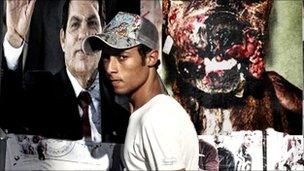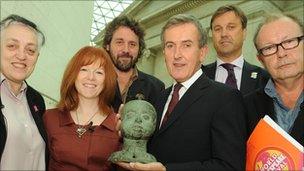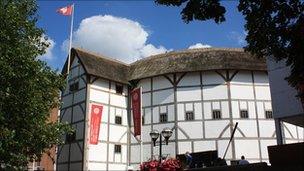London 2012: Shakespeare Festival leads cultural events
- Published

Macbeth Leïla and Ben – A Bloody History will be performed in Arabic
The World Shakespeare Festival is the "trump card" putting "art at the heart of the Olympics", the head of the Cultural Olympiad has said.
Ruth Mackenzie said the event, which is part of the London 2012 Festival - will put "culture back up there with sport" during next year's Games in London.
It will include thousands of performers in 70 productions, with global artists acting in their own languages.
The British Museum will host a show on London during Shakespeare's time.
Festival director Deborah Shaw said at the launch of the festival, which is being produced by the Royal Shakespeare Company, that it would "redefine what's possible in creating a festival in a global age".
The festival shows will include Jonathan Pryce as King Lear in a production directed by Michael Attenborough and Meera Syal playing Beatrice in Much Ado About Nothing, set in India.
There will also be two performances in Arabic - a Tunisian company will do a version of Macbeth while the Iraqi Theatre Company will perform Romeo and Juliet in Baghdad.

The team behind the festival said it was an "unprecedented" event
More than 50 arts organisations will take part in the festival, which is being supported by BP and the National Lottery.
British Museum director Neil MacGregor said its exhibition would "let us get into the heads of people in the theatres" during Shakespeare's time.
"Four hundred years ago people went to the playhouse to learn about the world," he said.
"The British Museum will present a unique take on the way in which Shakespeare staged the world for an increasingly diverse audience in the 17th century, at a pivotal point in our history."
Thousands of worldwide performers, both amateur and professional, are involved in the festival. Shows, including those specially commissioned, will take place both in London and across the UK.
The RSC has collaborated in the UK with venues including the Globe, the Almeida Theatre, the Barbican, the British Museum, National Theatre, National Theatre Wales, the Roundhouse and Sage Gateshead. Some of the productions will also be online.
The Globe, on the banks of the London's River Thames, has already announced that it will present all of Shakespeare's plays, staging one production itself with the remaining 36 plays each performed in a different language by a different company from around the world.
The aim will be to celebrate "the vast array of ethnic communities and languages that make up London's vibrant multi-cultural landscape".
Its artistic director Dominic Dromgoole said: "Shakespeare is the language which brings us together better than any other".
However there was some disagreement over whether the use of surtitles translating languages during performances not in English was a good idea. Surtitles are translated or transcribed dialogue or lyrics projected above a stage or displayed on a screen for the audience.
Dromgoole described them as an "incessant distraction" and said they would be used during the Globe performances only to describe the action of the scene. They would not translate the words being spoken.
But Warner and MacKenzie both said other performances would use full surtitles, with MacKenzie adding that audiences should not be "underestimated" and Warner saying surtitles were "not a distraction".
More than 260 amateur groups, with 7,200 performers aged from six to 90, will perform their own interpretations of Shakespeare everywhere from castles, parks and village halls to pubs, churches and a coffin works.

The Globe Theatre is hosting 37 plays in 37 languages
The festival also has an educational element, with the BBC exploring Shakespeare's role as "chronicler of our national history and identity".
Shakespeare Unlocked is a digital project featuring film excerpts of performances and workshops, with emphasis on 11 to 18-year-olds. It is part of a project between BBC Learning and RSC Education.
BBC Television will also feature Off By Heart Shakespeare, a verse-speaking contest culminating in a final filmed in the RSC.
Michael Boyd, artistic director of the RSC, said it was the most "outrageously collaborative of festivals", adding it was important to "step outside the familiar" and seeing Shakespeare performed by global artists would allow audiences to do this.
Mayor of London Boris Johnson added: "William Shakespeare is our greatest cultural export, and is quite rightly considered to be the finest writer of all time.
"This festival is a fantastic opportunity for these fine works to be brought to a new generation of schoolchildren, while at the same time reminding existing fans of Shakespeare's unparalleled insights into the workings of the human heart."
The festival will run from 23 April to 9 September next year with more than a million tickets going on sale from 10 October.
- Published20 January 2011
- Published7 December 2010